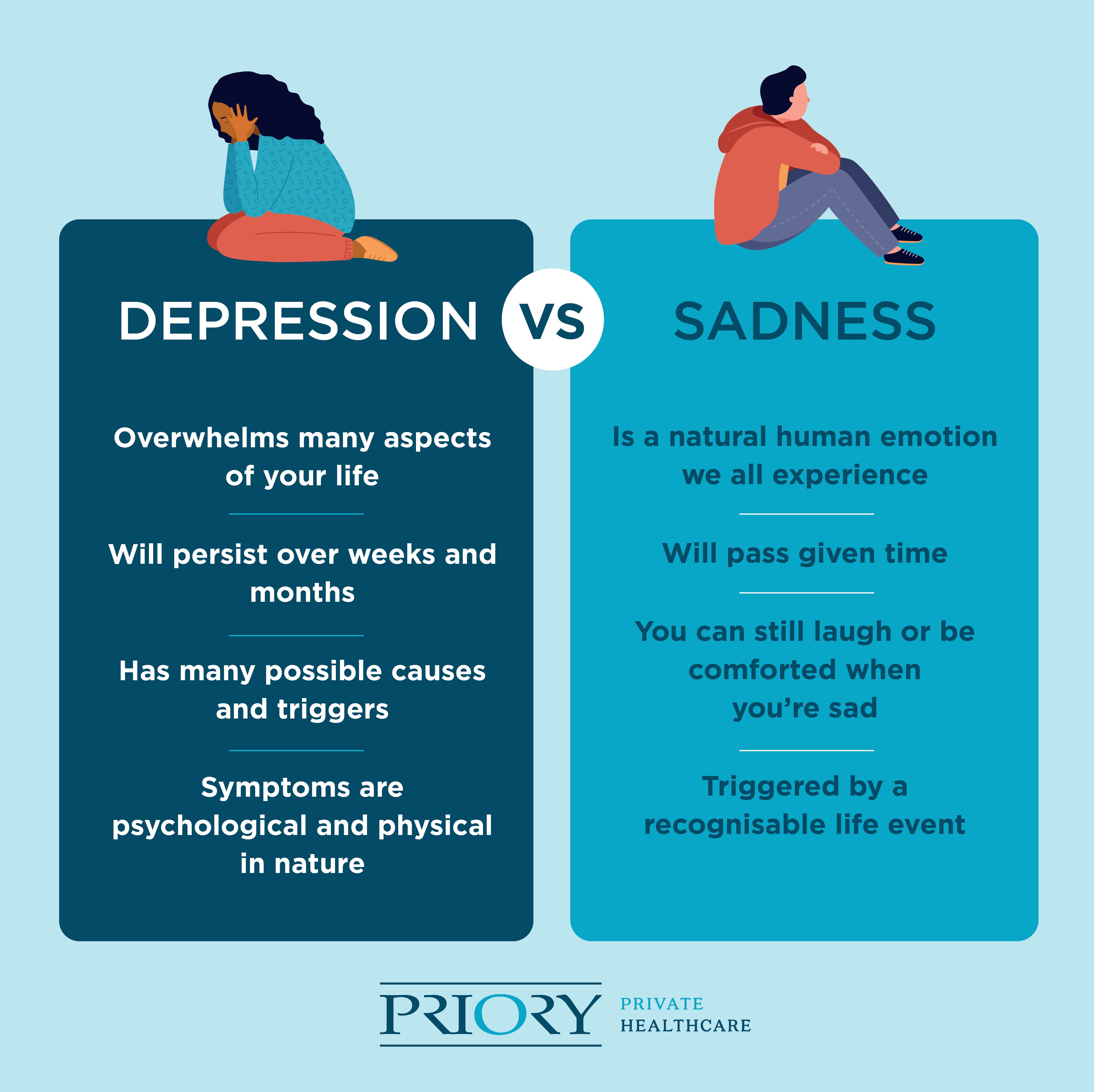The differences between depression and sadness
Sadness and depression share some similarities but are fundamentally different. Here, we discuss the two.
Sadness and depression share some similarities but are fundamentally different. Here, we discuss the two.



Sadness is a normal human emotion that we all feel from time-to-time, while depression is a longer-term mental health disorder that can have a negative effect on many aspects of your life.
Recognising the similarities and differences between sadness and depression can help us better understand our overall wellbeing. It can also help us to recognise the level and kind of support we need with our overall mental health.
Read on to discover the differences between depression and sadness.
Sadness is an everyday feeling that every human will experience in their lives. You’ll feel generally tearful, upset and have a low mood.
Feeling sad will usually have a direct trigger which you’ll probably be able to recognise. Upsetting life events are a common cause. This could be anything from failing an exam, losing your job, ending a relationship or losing a loved one.
Generally speaking, feelings of sadness will subside, especially if those negative triggers are reversed or some time elapses after the event.
Depression is a mental health disorder that can have an overwhelming effect on your ability to enjoy your life and function normally. It causes persistent feelings of sadness over many weeks and months. Statistics on depression suggest that over 250 million people across the world suffer with depression.
The causes of depression and sadness can often overlap. Traumatic or negative life events can lead to a diagnosed mental health condition like depression, but in some people, it may just trigger feelings of sadness over a period of time.
Depression also has many other causes. Your genetics, personality traits and experiences during childhood can all play a role in developing depression.
Many people with depression need professional support and treatment to see an improvement in their mood. Treatment for depression includes talking therapies like cognitive behavioural therapy (CBT) and antidepressant medication.

In the moment, feeling sad is a distressing and all-encompassing experience. You might think you're depressed and that it won’t get better. These emotions should be taken seriously, but there are some key distinctions that might suggest you're experiencing sadness rather depression:
Depression causes persistent feelings of sadness, hopelessness and anxiety, which will be near constant for days and weeks at a time. You’ll also likely experience many physical symptoms.
Here are some common symptoms of depression:
Depression will affect many aspects of your life. You might struggle to cope with the daily responsibilities you have in life, like attending work or giving parenting your full attention. Your social life might also decline, as you isolate yourself from friends and no longer find enjoyment in meeting up with them.
If your feelings of sadness haven’t faded after a couple of weeks, and the intensity of these feelings is seriously affecting your ability to live your life, then you could be struggling with depression. If you think that’s the case, there are steps you can take to improve your wellbeing.
Whether you’re going through a period of sadness, or think you have a diagnosable mental health condition, speaking up about how you’re feeling is really important. Initially, that could just be to your close friends and family.
Talking to someone about your depression can be incredibly difficult, but a problem shared is a problem halved. Just telling a friend that you’re not OK might lift a weight off your shoulders. Give it a try and see how much better you feel.
Self-care is an important part of maintaining your mental health. If you feel up to it, there are lots of things you can do to cope with your depression – here are a few suggestions:
Depression is a treatable condition, and recovery is entirely possible. Admitting you need extra support doesn’t mean you’re a failure. As an initial step, you could reach out to your GP, who can explore your symptoms and agree on the best next steps for you. They might recommend treatments like talking therapy, which can help you to process your thoughts and cope better with your symptoms.
Alternatively, you could reach out to a private provider of mental health treatment like Priory. We deliver world class treatment at a network of hospitals and wellbeing centres across the UK. Use the information below to get started.
